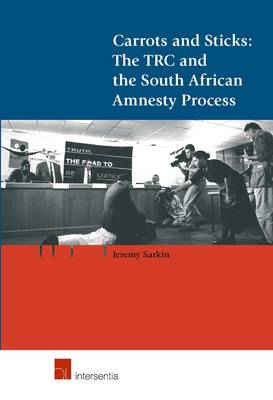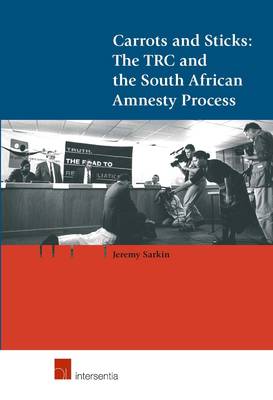
- Retrait gratuit dans votre magasin Club
- 7.000.000 titres dans notre catalogue
- Payer en toute sécurité
- Toujours un magasin près de chez vous
- Retrait gratuit dans votre magasin Club
- 7.000.0000 titres dans notre catalogue
- Payer en toute sécurité
- Toujours un magasin près de chez vous
Carrots and Sticks: The Trc and the South African Amnesty Process
The TRC and the South African Amnesty Process
Jeremy Sarkin
Livre broché | Anglais
74,00 €
+ 148 points
Description
This book is about the South African amnesty process. Many of the most well-known cases are investigated: the Cradock Four, the Pebco Three, the St James' Church, Heidelberg Tavern, Bisho, Boipatong, Trust Feeds and KwaMakutha massacres; the killing of Amy Biehl, Chris Hani, Steve Biko, Stanza Bopape, Fabian and Florence Ribeiro; the Motherwell, Magoo's Bar, Ellis Park Rugby Stadium, Church Street and Wimpy bombings, the Craig Duli coup, the applications of Craig Williamson, Trevor Tutu, Eugene de Kock and Jeffrey Benzien, the collective applications of the ANC 37 and APLA leaders, the Jerry Richardson case involving Winnie Madikizela-Mandela, and amnesty cases stemming from the Magnus Malan trial. The content of many of the amnesty decisions are investigated to see how the Amnesty Committee applied the amnesty law and whether the decisions were fair and consistent. The book examines the amnesty application numbers - the number of 'legitimate' applications, the spread across political affiliation, the number of female applicants, and who is a victim and who is a perpetrator. It looks at the extent to which the indemnity process that occurred between 1990 and 1995 undermined the 'carrot' of amnesty, whether the criminal justice system offered a sufficient 'stick' to coax potential applicants into the process, and how timing of events and attitudes of political parties influenced applications. Also considered is the timing of hearings, the role of the Investigations Unit, and the way in which the Amnesty Committee dealt with offences committed outside of South Africa, witchcraft applications and gender crimes. The subject of the final chapter is what happens next. Will those who were refused amnesty or who did not apply be prosecuted? A few significant themes or debates permeate the text; the extent to which the TRC was victim-centred or perpetratorfriendly; the extent to which the TRC and the amnesty process in particular, contributed to the discovery of 'sufficient' truth, a prerequisite for reconciliation; and the extent to which the TRC and its amnesty process actively attempted to facilitate national unity and reconciliation.
Spécifications
Parties prenantes
- Auteur(s) :
- Editeur:
Contenu
- Nombre de pages :
- 441
- Langue:
- Anglais
Caractéristiques
- EAN:
- 9789050954006
- Date de parution :
- 17-11-04
- Format:
- Livre broché
- Format numérique:
- Trade paperback (VS)
- Dimensions :
- 160 mm x 240 mm
- Poids :
- 730 g

Les avis
Nous publions uniquement les avis qui respectent les conditions requises. Consultez nos conditions pour les avis.






